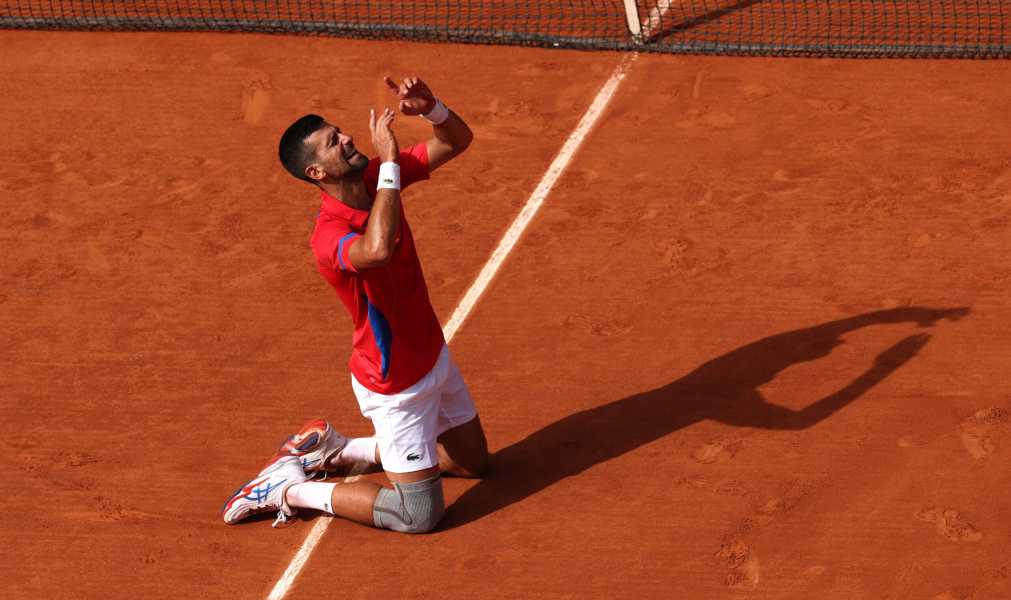The Serbian tennis great used his moment of triumph to defy the International Olympic Committee’s official secularism.

Credit: Matthew Stockman via Getty Images
No bureaucrat at the IOC was going to steal this performance from Novak Djokovic.
Teary-eyed, drenched in sweat, grateful, sprawled out on the clay, Djokovic rose from the Philippe-Chatrier Court at the Paris Olympics and made the sign of the cross. The gold medal that long eluded the greatest men’s tennis player of all time was now his. The match was an instant classic.
It wasn’t that the 21-year-old Spaniard Carlos Alcaraz played poorly. He played brilliantly. His sensational, cat-like spring was on display throughout every point in the first grueling set, a 90-minute stunner that saw Djokovic repel five straight break points in the all-critical 9th game.
The crowd oohed and ahhed. It was a matchup for the ages. Thunderous cheers could be heard in the Bois de Boulogne that lies beyond the stadium. The speed and grace of the youthful Alcaraz against the power and determination of the aging Djokovic.
Every time Alcaraz looked to wrest control of the second set, Djokovic found an answer. Visibly hobbled by a surgically repaired right knee, Djokovic played with all the guts and glory of a man who knew it would be his final chance at gold—drop shots that defied reason, forehand thumpers that left Alcaraz a spectator, and backhand returns that kept the Spaniard firmly planted on the touchline.
The 37-year-old Serbian was sensational. His match-winning forehand appeared to be hit with every fiber of his being. He collapsed onto the clay. His dream of winning gold, accomplished. The career golden slam. He had won everything in the sport.
Djokovic certainly understood the moment’s gravitas. In his post-match interview, Djokovic called the Olympic triumph “arguably the biggest success I’ve ever had.”
And as with every step of his starlit and at-times controversial career, Djokovic not only won with class, he won with immense courage in the face of political pressure to refrain. In an Olympic Games marred by anti-Christian controversy that prompted the Pope to issue a statement decrying the opening ceremony, Djokovic’s simple and blunt Appeal to Heaven has not gone unnoticed.
Article 50 of the Olympic Charter states that “No kind of demonstration or political, religious, or racial propaganda is permitted in any Olympic site.” And although the International Olympics Committee forced Brazilian surfer João Chianca to remove an image of Christ the Redeemer from his surfboard earlier in the Games, Djokovic was never going to let the suits at the IOC keep him from openly displaying his faith.
Reveling in the cool, night air of Paris, Djokovic told a reporter that “God is great” when he was asked what the gold medal meant to him.
It wasn’t the first time Djokovic praised God during the Olympic games. After his dominant semifinal victory against Italian Lorenzo Musetti, a Serbian journalist asked Djokovic what needed to be done to secure the gold medal against Alcaraz.
In an instant, Djokovic pulled out a silver cross tucked into his red shirt. “That’s what needs to happen. I pray to God that everything will be alright.”
Djokovic wasn’t the only Christian who defied Article 50 of the IOC charter. The U.S. runners Cole Hocker and Sydney McLaughlin-Levrone both used their gold-winning screen time to praise God. The Ethiopian runner Tsige Duguma penned a handmade sign that read “Jesus is Lord” after her silver-winning performance in the women’s 800m.
Djokovic’s display of faith is nothing new to the sporting world. It was those deep set beliefs that propelled him from tennis great to global hero during the Covid era.
Djokovic, whose 24 Grand Slam trophies makes him the most decorated tennis player of all time, was barred from competing in the 2021 and 2022 editions of the U.S. Open for his refusal to get vaccinated against Covid.
He was also deported from Melbourne in 2022 ahead of the Australian Open following a 10-day standoff, again due to Djokovic’s vaccine status. The Serbian giant returned to Australia in 2023 under revised vaccination standards and won the tournament. Despite losing the opportunity to add more Grand Slams to his name, Djokovic stated in 2023 that he has “zero regrets.”
Subscribe Today Get daily emails in your inbox Email Address:
It was only days after the Olympic finals when Djokovic announced the news – He would skip the Cincinnati Open. The titan of tennis needed a rest. Somewhere, Novak Djokovic kicked up his feet and opened Instagram.
“God gave me this and I’m very grateful because I believe everything in life happens for a reason,” Djokovic wrote. “I’ve tried to use my life’s calling to carry my cross honorably and represent my country and my family.”
And carry it honorably, he has.
Sourse: theamericanconservative.com






